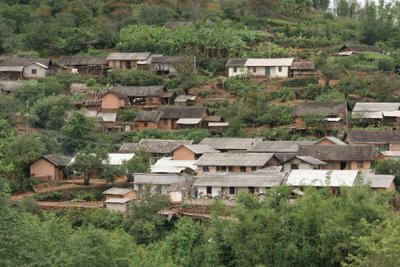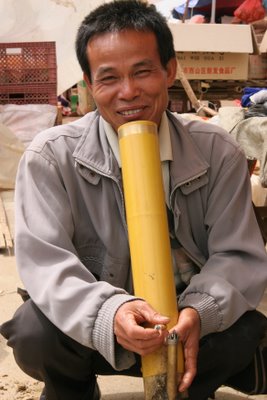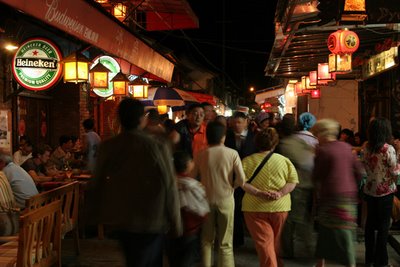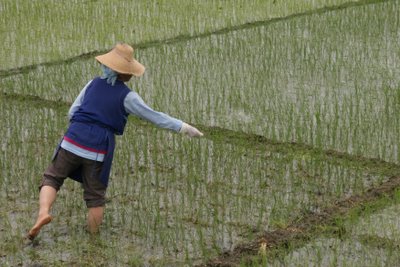Banna
What makes traveling in Yunnan so intriguing is that half the people who live there aren't Chinese. They belong to a hodgepodge of ethnic minorities increasingly confined to the jungles and highlands around the Lao and Myanmar borders.
The town of Xiding is just a few miles from Myanmar and is little more than a mud road winding along the mountainside with wood and brick houses precariously perched on either side. Many houses are level with the ground on one side and stilted on the other, with livestock underneath. Residents derive what little income they have from farming the hills for puer tea, prized by the Chinese for its medicinal qualities.
Most days of the week the town is drab and unassuming. But on Thursday mornings the town comes alive. The weekly market draws local Aini people as well as people from the Dai and Bulang minorities. The men are pretty non-descript. Some are there to butcher hogs or sell fish. But most spend the day playing cards, smoking, and drinking bai jiu, Chinese rice liquor. It's the women that give life to the market. Aini women typically wear navy blue dresses and checkered headdresses, and some still wear the elaborate bead and metal-work headdresses. Dai women are identified by their bright floral patterns and at the market are mostly selling satay-like BBQ. The Bulang women dress mostly in black and the older women wear large black turbans.
The Thursday market in Xiding is one of the last hold-outs of a vanishing lifestyle. The nearest ATM is only two hours away by bus.
 Residential Xiding. The market takes place "downtown," a concrete encased public square near the road the is the town's only connection to the outside world.
Residential Xiding. The market takes place "downtown," a concrete encased public square near the road the is the town's only connection to the outside world.
 No need for a barn. Plenty of space for the animals beneath the house.
No need for a barn. Plenty of space for the animals beneath the house.
 This little piggy went to market...
This little piggy went to market...
 Couple of pork chops, some bacon, hold the ash.
Couple of pork chops, some bacon, hold the ash.
 Colors of the Thursday market.
Colors of the Thursday market.
 Aini women make up the majority of the market's participants. In addition to the tea plantations they grow vegetables such as tomatoes and eggplants for sale at the market.
Aini women make up the majority of the market's participants. In addition to the tea plantations they grow vegetables such as tomatoes and eggplants for sale at the market.
 Aini woman in traditional headdress, traditional blue smock, and traditional red polo shirt.
Aini woman in traditional headdress, traditional blue smock, and traditional red polo shirt.
 Dai woman fanning the coals while preparing traditional BBQ. Best not to ask what the meat is. It's grilled and it's spicy and that's all you need to know.
Dai woman fanning the coals while preparing traditional BBQ. Best not to ask what the meat is. It's grilled and it's spicy and that's all you need to know.
 Dai on the right grilling BBQ, Aini on the left salivating. Mmmmmm, spicy mystery meat.
Dai on the right grilling BBQ, Aini on the left salivating. Mmmmmm, spicy mystery meat.
 Look, a baby! Everyone likes babies.
Look, a baby! Everyone likes babies.
 Look, a dentist. Everyone likes... oh wait, that looks painful. Check out the teeth displayed for sale on the table.
Look, a dentist. Everyone likes... oh wait, that looks painful. Check out the teeth displayed for sale on the table.
 I think this might be the anesthesiologist.
I think this might be the anesthesiologist.
The town of Xiding is just a few miles from Myanmar and is little more than a mud road winding along the mountainside with wood and brick houses precariously perched on either side. Many houses are level with the ground on one side and stilted on the other, with livestock underneath. Residents derive what little income they have from farming the hills for puer tea, prized by the Chinese for its medicinal qualities.
Most days of the week the town is drab and unassuming. But on Thursday mornings the town comes alive. The weekly market draws local Aini people as well as people from the Dai and Bulang minorities. The men are pretty non-descript. Some are there to butcher hogs or sell fish. But most spend the day playing cards, smoking, and drinking bai jiu, Chinese rice liquor. It's the women that give life to the market. Aini women typically wear navy blue dresses and checkered headdresses, and some still wear the elaborate bead and metal-work headdresses. Dai women are identified by their bright floral patterns and at the market are mostly selling satay-like BBQ. The Bulang women dress mostly in black and the older women wear large black turbans.
The Thursday market in Xiding is one of the last hold-outs of a vanishing lifestyle. The nearest ATM is only two hours away by bus.
 Residential Xiding. The market takes place "downtown," a concrete encased public square near the road the is the town's only connection to the outside world.
Residential Xiding. The market takes place "downtown," a concrete encased public square near the road the is the town's only connection to the outside world. No need for a barn. Plenty of space for the animals beneath the house.
No need for a barn. Plenty of space for the animals beneath the house. This little piggy went to market...
This little piggy went to market... Couple of pork chops, some bacon, hold the ash.
Couple of pork chops, some bacon, hold the ash. Colors of the Thursday market.
Colors of the Thursday market. Aini women make up the majority of the market's participants. In addition to the tea plantations they grow vegetables such as tomatoes and eggplants for sale at the market.
Aini women make up the majority of the market's participants. In addition to the tea plantations they grow vegetables such as tomatoes and eggplants for sale at the market. Aini woman in traditional headdress, traditional blue smock, and traditional red polo shirt.
Aini woman in traditional headdress, traditional blue smock, and traditional red polo shirt. Dai woman fanning the coals while preparing traditional BBQ. Best not to ask what the meat is. It's grilled and it's spicy and that's all you need to know.
Dai woman fanning the coals while preparing traditional BBQ. Best not to ask what the meat is. It's grilled and it's spicy and that's all you need to know. Dai on the right grilling BBQ, Aini on the left salivating. Mmmmmm, spicy mystery meat.
Dai on the right grilling BBQ, Aini on the left salivating. Mmmmmm, spicy mystery meat. Look, a baby! Everyone likes babies.
Look, a baby! Everyone likes babies. Look, a dentist. Everyone likes... oh wait, that looks painful. Check out the teeth displayed for sale on the table.
Look, a dentist. Everyone likes... oh wait, that looks painful. Check out the teeth displayed for sale on the table. I think this might be the anesthesiologist.
I think this might be the anesthesiologist.







